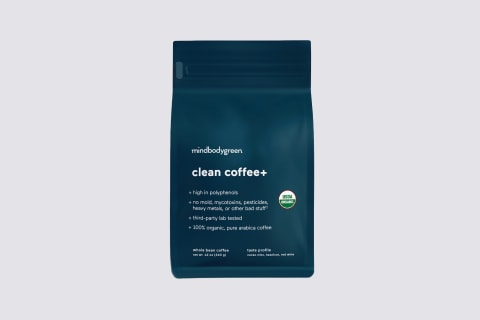Advertisement
Coffee For Life: How The Polyphenols In Coffee Might Promote Longevity


Last year, the Blue Zones Netflix Documentary gave us a glimpse into the lives of some of the oldest people in the world. The show spanned from the highlands of the Mediterranean to the coasts of Central America, but there was one drink that appeared in wrinkled hands across the globe: You guessed it, coffee.
"In Nicoya, Costa Rica; Sardinia, Italy; and Ikaria, Greece, people live statistically longest. And they all drink coffee," Blue Zones founder Dan Buettner previously told mindbodygreen.
It's not a mere coincidence that some of the world's longest-lived people enjoy a daily cup of joe. Besides helping enhance energy and focus, coffee has been tied to a lower risk of premature death1 by heart disease and cancer. In one study on nearly 500,000 adults2, drinking up to eight cups of coffee (both decaf and caffeinated) a day was inversely associated with mortality.
Some research has found that habitual coffee drinking may reduce one's risk of Type 2 diabetes3 and obesity4.
So, what's behind coffee's longevity benefits? For starters, the caffeine in coffee can increase energy and reduce fatigue, which may help people stay more physically active5. It's also been shown to rev up metabolism6 and enhance fat burn7 in some cases.
But the fact that decaf has also been associated with a longer life span means there must be more to the brew's benefits than caffeine alone.
To get a full picture of what makes coffee healthy, you need to look at its polyphenols.
Meet coffee's wide array of polyphenols
Polyphenols are downright amazing compounds produced naturally in plants. Coffee plants are packed with thousands of phytochemicals8, which help protect them from being damaged by outside threats like insects, fungi, and diseases. Interestingly enough, when we eat (or drink) said plants, some of these protective mechanisms seem to be passed along to us, too.
The antioxidant polyphenols in coffee help protect our cells from free radicals and oxidative stress9 that damage them. Each class of polyphenol seems to have its own unique properties, and there's still a lot we have to learn about each one.
For example, chlorogenic acid, one of the most widely studied polyphenols, has been shown to improve cardiometabolic health10, as well as act as a central nervous system stimulator11. Ferulic acids have been found to reduce oxidative stress and improve inflammatory status12, while rosmarinic acid is being studied for its potential protective effect on the liver13. Other polyphenols of special interest to researchers include coumaric acid for mood support14 and caffeic acid for inflammation reduction15. In a good cup of coffee, all of these diverse plant compounds come together in a delicious way.
The volume and diversity of polyphenols will vary in different coffee products. That's because the roasting method, storage technique, and even brew type can all influence the composition of the final cup. Where and how coffee beans are grown also have a huge impact on their polyphenol count.
If you want to get the most benefits from your brew, it makes sense to choose a coffee that is grown and processed to protect these all-important plant compounds. clean coffee+ is one such blend.
mindbodygreen's new whole-bean coffee is organically grown in nutrient-dense soil and hand-picked at peak ripeness. It's then roasted and dried in a way that prevents mold and mycotoxins (which are surprisingly common in coffee) but promotes an impressive array of native polyphenols with antioxidant benefits for whole-body health. We know this because we rigorously tested the beans for heavy metals, mycotoxins, pesticides, and solvents, as well as total polyphenols.†
"If I'm going to drink coffee, I want to make sure I'm getting as much of those polyphenols as possible—it's like getting extra credit every time I make a cup," mindbodygreen's co-founder and co-CEO Jason Wachob writes of the product. "Our beans are grown and processed in a way that retains more of their beneficial plant compounds."
The careful production process also lends to a standout flavor: Rich, smooth, and slightly sweet, it's a blend that sippers everywhere are loving for much more than just its longevity perks.
The takeaway
Coffee is one of the most significant sources of polyphenols16 in the world, and these plant compounds give the brew some impressive health benefits. To take full advantage of them, look for beans that have tested high for polyphenols like mindbodygreen's clean coffee+.†
16 Sources
- https://pubmed.ncbi.nlm.nih.gov/34468722/
- https://jamanetwork.com/journals/jamainternalmedicine/fullarticle/2686145
- https://pubmed.ncbi.nlm.nih.gov/33807132/
- https://www.ncbi.nlm.nih.gov/pmc/articles/PMC6628169/
- https://pubmed.ncbi.nlm.nih.gov/30135386/
- https://pubmed.ncbi.nlm.nih.gov/27824614/
- https://www.ncbi.nlm.nih.gov/pmc/articles/PMC7599629/
- https://link.springer.com/article/10.1007/s00217-014-2356-z
- https://www.mdpi.com/2076-3921/2/4/230
- https://www.mdpi.com/2306-5710/5/1/11
- https://pubmed.ncbi.nlm.nih.gov/29080460/
- https://pubmed.ncbi.nlm.nih.gov/29865227/
- https://pubmed.ncbi.nlm.nih.gov/30328397/
- https://pubmed.ncbi.nlm.nih.gov/35626632/
- https://www.ncbi.nlm.nih.gov/pmc/articles/PMC7914463/
- https://www.ncbi.nlm.nih.gov/pmc/articles/PMC7353358/



















